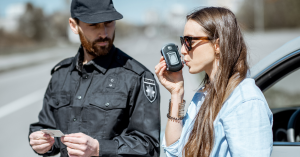 Being charged with driving under the influence is always a very serious charge. Anytime you’re pulled over and arrested for a suspected DUI, you can be confident that the police officer is going to request a blood test or a breathalyzer test, depending on whether they think you’re under the influence of alcohol, drugs, or both. A conviction for a DUI carries significant consequences on its own, but many people don’t realize that refusing to take the breath or blood test can carry its own additional consequences. If you need assistance or information related to a DUI, Churchill Criminal Defense is here to help you understand breath and blood tests in Denver. Contact a Denver DUI Breath and Blood Test Lawyer today at (303) 832-9000 or use our easy online contact form to schedule a free consultation.
Being charged with driving under the influence is always a very serious charge. Anytime you’re pulled over and arrested for a suspected DUI, you can be confident that the police officer is going to request a blood test or a breathalyzer test, depending on whether they think you’re under the influence of alcohol, drugs, or both. A conviction for a DUI carries significant consequences on its own, but many people don’t realize that refusing to take the breath or blood test can carry its own additional consequences. If you need assistance or information related to a DUI, Churchill Criminal Defense is here to help you understand breath and blood tests in Denver. Contact a Denver DUI Breath and Blood Test Lawyer today at (303) 832-9000 or use our easy online contact form to schedule a free consultation.
A driver’s blood alcohol content is one of the most important pieces of evidence in any DUI case. After you have been arrested, the police will give you the option to take a blood or breath test. This test is voluntary, and you have the right to refuse the test. However, your refusal can be used against you in court. For this reason, among others, you should submit to a breath test when you are asked to do so.
When you’re pulled over and the officer suspects you’re driving under the influence, they may ask you to take a preliminary breath test (PBT). This is a handheld breathalyzer device that will help the officer determine if they’re going to place you under arrest for driving under the influence. You are not required to take the preliminary breath test, and you won’t lose your license for refusing to do so. However, if you are placed under arrest for suspicion of driving under the influence, you will be asked to take a breath or a blood test so the officer can determine if you had drugs or alcohol in your system.
It is better to take the blood alcohol test than to refuse it. There are negative consequences both at the DMV hearing and in your DUI criminal case for refusing the test.
First, if you refuse the test you will face a longer revocation of your license at the DMV. On first offenses, your license revocation will increase from 9 months to one year if you refuse the test, with no possibility of early reinstatment. On Second offenses, your revocation will increase from one year to two years if you refuse the test. There is no possibility of getting a probationary license if you refuse the test.
Second, the officer who testifies in your criminal case will be allowed to tell the jury that you refused to take the test, and the prosecutor will be allowed to say to the jury that your refusal shows that you are guilty. It is important to recognize that this is very different from your Constitutional right to remain silent. If you remain silent when you are arrested, no one will be allowed to say anything about it later in court — or even let the jury know that you didn’t speak. But if you refuse the blood alcohol test, the prosecution can use that against you in trial.
If you refuse a chemical test – a breath or a blood test – you can be penalized in the following ways:
In many circumstances, the police officer must give you the choice between a breath or a blood test. In the following circumstances, you will not have a choice and the officer will decide which test to perform:
It can be complicated to decide which test to choose. It is important that you agree to take the test, otherwise you face automatic consequences that will make your life much more difficult than it needs to be. Many people believe that if they refuse the chemical test, there won’t be evidence against them showing that they were driving under the influence. This generally isn’t true. There will be officer observations and the fact that you refused the test will almost certainly be admitted into evidence if the case goes to trial.
If you refused a breath or a blood test, it’s smart to contact an attorney right away to see if they can help you schedule a DMV hearing to contest the license suspension. Churchill Criminal Defense has been handling DUI cases for more than 22 years and is always here to assist. When you hire Kevin Churchill of Churchill Criminal Defense, you’re hiring an attorney genuinely cares about the outcome of your case. Find out more about Denver breath and blood tests today at (303) 832-9000 or use our easy online contact form to schedule a free consultation.
